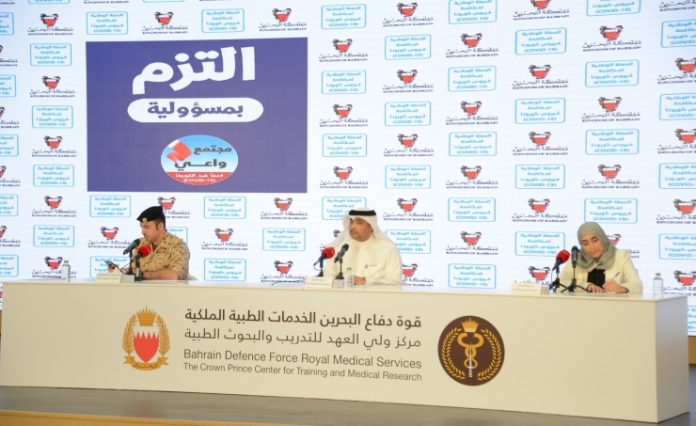The National Taskforce for Combating the Coronavirus (COVID-19) held a press conference at the Crown Prince Centre for Training and Medical Research at the Bahrain Defence Force Hospital to highlight measures to mitigate the spread of COVID-19.
Dr. Waleed Khalifa Al Manea, Undersecretary at the Ministry of Health and member of the National Taskforce for Combating the Coronavirus, noted that the vigilance of citizens and residents is a central component that supports mitigation efforts.
On this note, Dr. Al Manea highlighted that recent COVID-19 testing results indicate the Basic Reproductive Ratio average for the period between 13 May to 9 June has increased to 1.52 (1.83 for citizens and 1.35 for non-citizens), which is attributed to non-adherence with precautionary measures in place.
Dr. Al Manea added that the Kingdom is closely monitoring available COVID-19 data to review its evidence-based policy choices in order to ensure the best response is undertaken, evidenced by the introduction of the home-isolation option for active cases based on set criteria.
Dr. Al Manea went on to note that the introduction of treatment at home does not indicate a shortage of hospital beds, as the data demonstrates: isolation centre capacity stands at 8,511 beds, of which 5,061 beds are being occupied, and quarantine centre capacity stands at 3,410 beds, of which 492 beds are occupied.
Additionally, Dr. Al Manea expressed his appreciation for the efforts demonstrated by the 444 National Call Centre team who have responded to 85,000 calls this week and 445,000 callers since its launch in February.
Dr. Al Manea concluded by reiterating the importance of relying on accurate information from credible sources, such as the Ministry of Health’s website as well as the ‘BeAware Bahrain’ application, which both provide a range of services alongside the provision of accurate information.
Lt. Col. Manaf Al Qahtani, Infectious Disease Consultant & Microbiologist at the BDF Hospital and member of the National Taskforce for Combating the Coronavirus, clarified how a contact of an active case is determined, as follows:
- Members of the same household of an active COVID-19 case
- Colleagues who have had direct contact with an active COVID-19 case for longer than 15 minutes or have been within two meters with the active case without Personal Protective Equipment (PPE)
- Individuals who have had direct contact with an active case
- Individuals who have been in a closed environment with an active COVID-19 case
- A health care worker, or anyone else providing direct health care to an active COVID-19 case, or laboratory workers who handle COVID-19 samples without wearing the recommended PPE, or in case of a possible breach in the PPE
- Those who have been in an airplane, bus, car, or any other transportation vehicle, two seats away (in any direction) from an existing active COVID-19 case or those providing health care to the crew or driver present
- If symptoms are severe or indicate extensive exposure, all passengers travelling by those modes of transportation with the index case (plane, bus, car, etc.) may be considered as close contacts of active cases
Dr. Manaf affirmed that Bahrain is managing a comprehensive contact tracing program to swiftly identify and test contacts of active cases, adding that those who test negative are required to quarantine at home for 14 days and retest at the end of their quarantine period.
Dr. Jameela Al Salman, Consultant of Infectious and Internal Diseases at Salmaniya Medical Complex, stressed that failure to comply with preventative measures has been the main driver in the increased number of COVID-19 cases, to which the Ministry has responded by increasing testing capacity. Dr. Al Salman noted that over 386,000 tests have been conducted to date.
Dr. Al Salman stressed that face masks must be worn at all times when in public settings, including during outdoor recreation, as well as when in close proximity to family members with underlying health conditions or when in close proximity to elder family members. This decision does not extend to when driving cars or participating in strenuous activities, such as running, swimming or cycling.
To conclude, Dr. Al Salman reviewed the health status of active cases, confirming 5,061 cases are stable from a total of 5,084 active cases. Currently highlighted, 79 COVID-19 cases are receiving treatment, of which 13 are in a critical condition.

